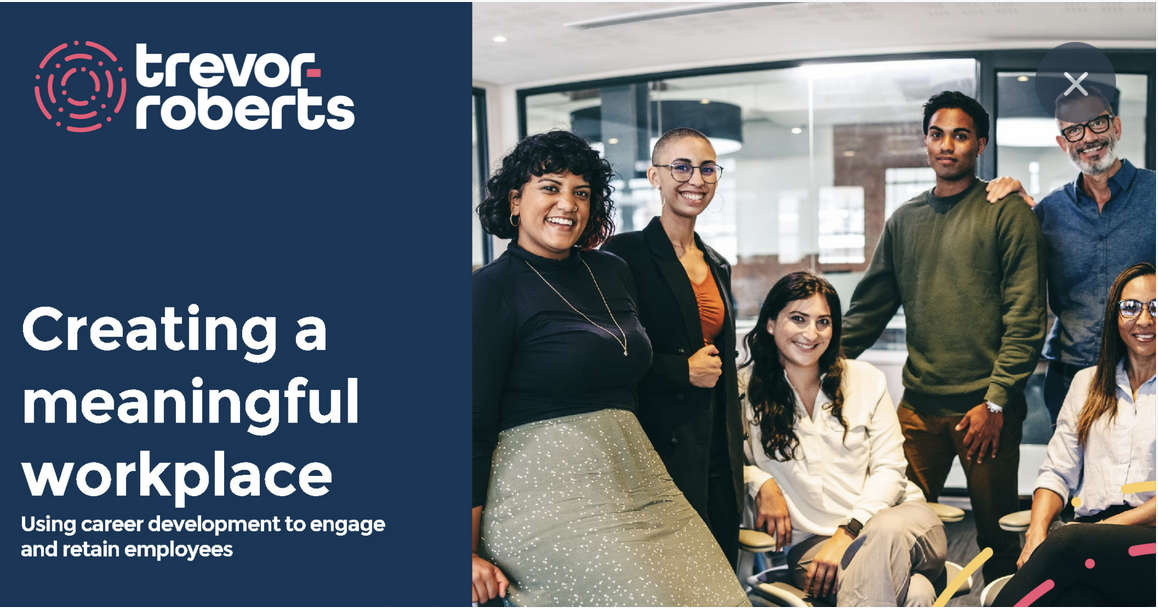As most HR professionals and leaders are now aware, money is not the primary motivator when it comes to your employees wanting to stay in their role. Instead, it is intrinsic factors such as a sense of meaning and purpose, contribution, connectedness, and wellbeing that really motivates employees.
One of the real privileges of working as a consultant is hearing about, and sometimes being a part of, the amazing work that is being done by my clients. Human Resources teams are implementing a wide variety of impressive and interesting initiatives to attract, engage, develop and retain talented workforces. Included in these initiatives is the development of sophisticated workforce plans, the implementation of mature talent management strategies, and the completion of work to gain a strong grip on the critical roles and capability profiles of organisations’ workforces. Strategic Human Resources functions are also grappling with the question of how to continuously improve their approach to talent management and remain employers of choice in their changing markets.
Across all this work, I have noticed a distinct opportunity to take talent management to the next level, and to achieve a truly integrated, strategic and holistic approach. This is the implementation of career development frameworks that complement and enhance all other talent management initiatives.
Now, when I say career development framework I don’t mean mapping internal career pathways and the associated capabilities required for each role or pathway - although this could form a very useful component of any talent management strategy. Instead, what I mean is a structured set of initiatives that assist employees to make sense of:
- who they are in the workplace;
- the role that their careers play in their wellbeing, life satisfaction and sense of meaning; and
- how to craft their roles and careers to achieve a sense of purpose, contribution, connectedness, and engagement.
Fundamental to such a career development framework is research on job crafting which demonstrates that any role can be imbued with meaning and that when this occurs, employees are happier in their roles, more engaged and use greater discretionary effort.
Job crafting allows individuals to find more meaning in their role by changing either the relational boundaries, job tasks or cognitive tasks.
Perhaps most importantly though, a career development framework can be easily integrated into existing human resources initiatives - across the entire employee lifecycle - and can both compliment and strengthen those initiatives.
Let me show you how:
Attracting talent
A compelling Employee Value Proposition (EVP) helps individuals to answer the question “what’s in it for me?” when considering if they would like to join your organisation.
A career development framework can be easily added as a benefit in your EVP and will explicitly and powerfully demonstrate the opportunities afforded to employees to craft and further develop their careers.
With 84% of job seekers interviewed by Seek indicating they were most attracted to organisations that offered career development, flexible work arrangements and extra superannuation, it would seem that a career development framework can have a significant impact on your organisation’s ability to attract talent.
Engaging talent
Many of my clients implement regular employee engagement surveys and many of them express frustration that year on year employees report that they are dissatisfied (or less satisfied) with the availability of opportunities for career progression. In many cases, this factor is found to be a strong predictor of overall employee engagement and is highlighted as an area requiring action.
A published career development framework communicates to employees the organisation’s commitment to supporting their career progression, while the associated career development initiatives help employees to take ownership of their careers, to explore the career development opportunities available to them and to understand that meaningful career progression does not necessarily mean promotion. In this way, a career development framework is likely to be a key driver of engagement in your organisation and may prove to be the trick to shifting the needle on that pesky employee engagement survey question.
Developing talent
Many organisations implement a process of regular performance and development discussions between employees and their managers. Training managers to turn these discussions into career conversations can enrich the experience for both the employee and the manager.
Employees are encouraged to set performance and development goals in the context of their broader careers and are helped to see the opportunities afforded to them by their current roles. In turn, this deepens the employees’ sense of engagement, satisfaction and meaning in their work, as well as increases their motivation to engage in the development activities chosen.
Managers, on the other hand, are benefited by a deeper understanding of employees’ motivations, and are empowered to have conversations with their employees about potentially tricky subjects such as:
- opportunities for promotion;
- the employee’s level of engagement;
- the employee’s current performance; and
- the performance required to achieve the employee’s career gaols.
From these discussions, organisations gain access to information about employees’ motivations, career goals, intended tenure and desire to progress into other roles. This information can be instrumental when identifying successors, planning future workforce needs, developing high potentials, identifying training needs, planning for the retirement of older workers and developing a leadership pipeline.
With research into adult learning principles indicating that employees are more likely to engage in learning when they can see its relevance to their own context, it seems that a career development framework that is able to explicitly connect development initiatives to employee’s career and life goals will contribute significantly to the learning outcomes and ROI achieved by L&D.
Retaining talent
It is probably fair to say that the days of remaining with a single employer across your entire career are all but gone. Recent estimates indicate that employees will change jobs on average every 2-3 years. In this context, developing strategies for retaining key talent becomes even more important. A career development framework can be a useful tool in increasing retention as it provides employees with structured opportunities to reflect on their careers and to think about avenues for their career development beyond the next promotion or next pay rise. Career development conversations, workshops, resources, videos and lunch n’ learn sessions can be easily incorporated into existing offerings to provide employees with information and advice about their careers and to help them capitalise on opportunities provided by their current organisation that they may not have previously considered.
At Trevor-Roberts, we believe that a fulfilling life involves meaningful work. We recognise the role that careers can play in allowing people to express and develop their sense of who they are, and to find purpose and contribution. We are passionate about ensuring the significant amount of time that people spend in workplaces is meaningful and satisfying, and helping our client organisations to enact the systems and structures of work that facilitate career success. I believe that partnering this deep understanding of how people perceive, understand and enact their careers with the incredible Human Resources expertise and talent management practices being implemented in organisations today is the critical next step in creating truly productive and satisfying workplaces.
For more information on Career Development Frameworks, please contact one of our Client Relationship Managers on 1300 876 118.












